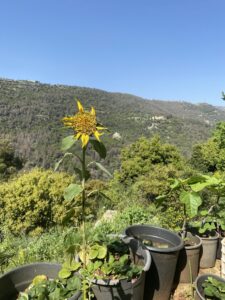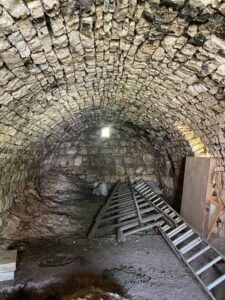the terraces of bassatin baanoub
a springtime visit
Away from the flat plains of the Bekaa valley, farming in the mountain areas of Lebanon has a very different feel. Ignoring Foreign Office recommendations not to visit Lebanon this Easter (family and friends to see, producers to chat to, food to eat etc.) we set off in the sun towards Saida (Sidon), turned left and headed up a mountainous road to visit Yasmina Raffoul and her husband Jean-Pierre Zahar. They and their team make up bassatin baanoub and thanks to their hard work we import their oregano (Origanum syriacum) and za’atar mix to the UK.

the advantages of farming on terraces
Not every farm in Lebanon has a Roman well still in use or storage built in the Byzantine era. Yasmina treasures these archeological landmarks on the terraces they have rented from the nearby convent, but it’s the plants and trees which take centre stage. Given that their land rises from stream level up to 550m, they can grow a diverse range of trees and plants on the terraces because of the different altitudes. Terracing makes farming on a slope easier (although challenging on the calf muscles). This isn’t a place for tractors and heavy machinery. Nimble and athletic farmers are key.

the aroma of orange blossom
The heady aroma of orange blossom kept us company as we walked through the terraces peppered with almond, avocado, carob, olive and mulberry trees. Yasmina showed us how the fragrant flowers of bitter orange tree, picked by hand, are made into floral waters using a still. This floral distillate, popular in Lebanese desserts, when added to boiling water makes “café blanc” or قهوة بيظء (white coffee) in Arabic, a soothing hot drink that aids digestion and sleep.

the art of floral distillation
Picking the odd green almond for us, which we ate whole crunching through the soft outer skin, Yasmina talks with real love about the land she is the custodian of. As she pointed out olive trees coming into blossom, she remembered when in 2019 they had to choose between watering their organic vegetables or the trees; there wasn’t enough water for both. As a result, they needed to change the focus of their business. Planting oregano, sage, roses, lavender, rose geranium on the terraced land works well. Using the flowers to make floral distillates and “tisanes” (herbal infusions) tap into Lebanon’s deep understanding of this art. Not only are they immensely popular in the local market, but they’re also easier to handle in terms of production and storage.

eating what you grow
We ended the visit gathered round Yasmina and Jean-Pierre’s table eating their olives, almonds, honey and carob molasses and talking about the Israeli drone buzzing overhead. A reminder of the challenges farmers face in the south of Lebanon – making us appreciate their aromatic ingredients even more.
